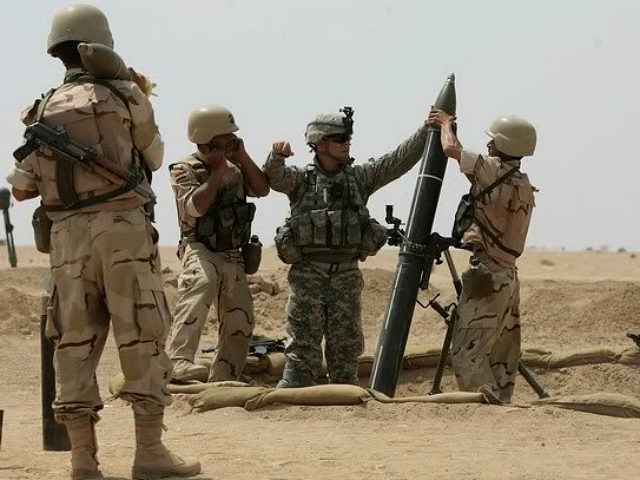The number of U.S.-led coalition advisers in Iraq has nearly doubled in size to 450, a move that reflects the intensified offensive to retake Mosul, the last major Islamic State (ISIS/ISIS) stronghold in the country.
Those advisers have entered Mosul alongside American and Iraqi forces, revealed U.S. Air Force Col. John Dorrian, a Baghdad-based spokesman for the U.S.-led coalition.
“Maybe around 450 or so advise and assist” Iraqi Security Forces participating in the ongoing Mosul offensive, said Col. Dorrian.“That is right about double what we had been doing before.”
“The arrangements for the increase in advise and assist forces was made to support phase two of the operation, so it’s been in the last couple of weeks,” he added.
According to the Pentagon’s count, there are now 4,935 U.S. troops in Iraq, including trainers, security forces and other support troops.
U.S.-led coalition advisers are charged with performing various roles, including accompanying Iraqi troops as they move around the battlefield and providing engineering and intelligence support.
“They are not meant to be involved in direct combat, although they have come under fire at times,” notes the Associated Press (AP). “One adviser, Navy Chief Petty Officer Jason C. Finan, was killed by a roadside bomb on Oct. 20 near Mosul.”
Some news outlets, such as Reuters, the New Yorker, and Breitbart News, have reported that U.S. troops are providing support to Iran-backed Shiite militias, including some with a bloody history of killing American service members.
Referring to the recently deployed advisers, Col. Dorrian told reporters he could not disclose their specific locations for security reasons but added that they are not on the front line.
“They remain behind the forward line of troops,” he said, but added that they have entered Mosul “at different times.”
Dorrian noted that the Iraqis are succeeding in putting ISIS jihadists under greater pressure.
He told reporters:
One of the things that’s really important to understand about the ongoing battle in Mosul is that the city is completely surrounded… and the enemy doesn’t have the ability to resupply or reinforce their fighters.
They’re increasingly isolated on the eastern side of the city because of the damage that has been done to the bridges that are there, so they don’t have the ability to bring over resources or fighters from the west.
And what that means is that as their resources dwindle, and to be clear, you know, there’s been a lot of discussion about the losses that Iraqis are taking, the enemy is taking an order of magnitude greater.
Nevertheless, the coalition spokesman acknowledged that ISIS has developed well-established defenses in and around Mosul that has slowed the pace of the advance by the U.S.-backed Iraqi alliance, which includes Kurdish Peshmerga troops, Shiite militias, and some Christian fighters.
ISIS terrorists “have shown no reluctance whatsoever to attack civilians or use civilians as shields and this slows things down,” said the colonel. “And then there are more than 200,000 buildings in Mosul.”
“In order to do this properly, given the way that the enemy has conducted themselves, you end up having to clear each one,” he added. “And that goes from rooftop level, often in four-story or higher buildings, through every single room, and every single closet, and into tunnels that have been dug between these buildings, and sometimes beneath them. And it’s just slow-going and it’s just going to take some time.”
Last month, Fox News learned from the U.S. military that the anti-ISIS coalition has killed at least 50,000 jihadists in Iraq and Syria over the last two years.
Although the U.S. initially said it was not going to support Turkey’s campaign against ISIS militants in the Syrian city of al-Bab, Dorrian revealed the U.S. government is discussing with Turkish officials the type and level of military support it will provide for that operation.
Turkey, a member of the U.S.-led coalition, recently asked its NATO ally the United States for air support in al-Bab, and the American military provided a “visible show of force” without carrying out airstrikes, the Pentagon has confirmed.

COMMENTS
Please let us know if you're having issues with commenting.